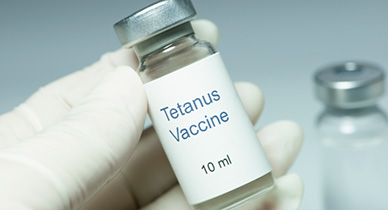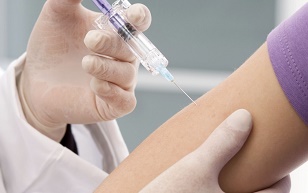Tetanus is a fatal infection for which prevention is the best strategy. Tetanus vaccine plays a critical role in this regard. The vaccine consists of weakened tetanus toxins which, when injected into the body, will trigger the production of antibodies that attack the invading organisms and form immunity against tetanus.
How Long Is a Tetanus Shot Good For?

If a person has received the primary as well as the booster tetanus shots according to the EPI schedule, the vaccine is effective for up to 10 years. Then how long is a tetanus shot good for people who are at high risk of exposure to the tetanus? For such kind of people, they should receive booster doses every 5 years. You should make sure that you have receive the full course of tetanus immunization as follows:
1. Kids Under 10 Years
For children under 10 years of age, the primary course of vaccine is given in the form of 3 doses as DTaP (diphetheria/tetanus/pertussis) along with the injectable polio vaccine (IPV) and hepatitis B vaccine (HiB). These doses are administered at the second, third and fourth month after birth of the baby.
Children receive the 4th dose of the tetanus vaccine 3 years after the primary course. This is known as the “preschool booster” and is given at the age of 3 in the form of DTaP along with the IPV. The 5th dose, commonly called the “school leaving booster”, is given between 13 and 18 years of age in the form of Td (tetanus/diphtheria) along with IPV.
2. Kids Over 10 Years and Adults
In children who have crossed the threshold of 10 years old and in adults who have not received the tetanus vaccine during their early years, the primary course of tetanus vaccine consists of 3 doses of Td given one month apart. Injectable polio vaccine (IPV) is also administered alongside. The 4th dose is given 5 years whereas the 5th dose is given 10 years after the primary course in the form of Td along with IPV.
When Should You Get Tetanus Shot?

How long is a tetanus shot good for? Now you know the answer. It is also important to know who should get tetanus shot. Every child should receive the tetanus vaccine according to the schedule. Adults need to get the tetanus vaccine if:
- They have not been immunized against tetanus as children
- They did not receive booster doses during the past 10 years
- They recovered from tetanus
- They are in the third trimester of pregnancy
In case of an injury, tetanus shots are recommended only if you have not been vaccinated previously. However, the following types of injuries demand immediate immunization irrespective of the immunization status.
- Dirty wounds smeared with grime, dust, soil or manure
- Puncture wounds that cause a break in the continuity of the skin such as those caused by splinters, nails, needles, glass shards, and bites
- Second degree burns and third degree burns
- Crush injuries such as those caused by road traffic accidents which result in excessive soft tissues damage
- Necrotic or gangrenous wounds containing dead tissues. Such wounds are likely to get infected due to absence of blood supply
- Wounds containing foreign bodies like gravel
When Not to Get Tetanus Shot
Tetanus vaccination should be avoided in the following cases:
- Previous history of allergic reaction to tetanus vaccine
- Previous history of seizures or coma a week after tetanus vaccination
- Previous history of pain and swelling after tetanus vaccination
- Febrile illnesses
- A history of nervous system disorders
- A history of Guillain-Barre syndrome (GBS)
Benefits of Tetanus Shot
How long is a tetanus shot good for? Usually you will benefit from tetanus shots for ten years. Tetanus immunization protects you from the tetanus disease since the vaccine consists of a potent toxoid that inhibits the release of toxins from the bacteria.
The vaccine also helps you avoid the more severe form of the disease and lessen the intensity of the symptoms, especially the respiratory symptoms that can lead to death. Since the 1920s, the vaccine has been in use and has been clinically proven to be effective in neutralizing the bacterial toxins and providing immunity against tetanus.
Side Effects of Tetanus Shot
Actually, there are some common adverse effects associated with tetanus vaccine, but its benefits far outweigh its potentially side effects:
- Pain, tenderness, swelling or redness at the injection site
- Mild fever
- Headache
- Generalized body ache
- Joint pain
- Weakness or fatigue
In some cases, the tetanus shots can induce a rather severe form of allergic reaction called “anaphylaxis” within a few minutes after receiving the shots, which manifests as:
- Clammy skin
- Skin itching and swelling
- Difficulty in breathing
- Nausea, vomiting
- Diarrhea
- Abdominal pain
- Light headedness
- Palpitations
- Low blood pressure
If you experience any of the above allergic symptoms after tetanus vaccination, call emergency help at once. Besides, it is imperative to report the type of vaccine and the subsequent reaction to the doctor.
